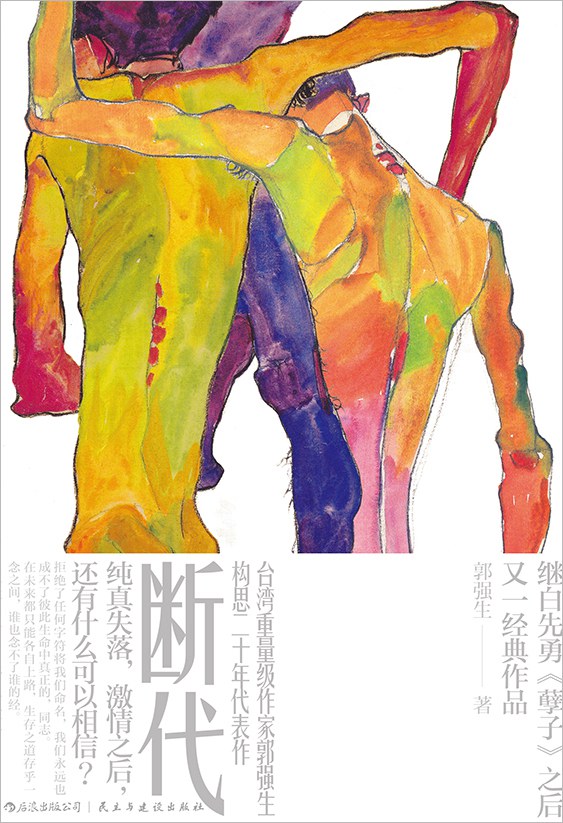1
/
of
1
dating
dating
Guo Qiangsheng
Regular price
$12.99 USD
Regular price
$12.99 USD
Sale price
$12.99 USD
Unit price
/
per
Low stock
Couldn't load pickup availability
About Book
About Book
Generation
After the loss of innocence and passion, what else can we believe in?Following Bai Xianyong's "The Unjust Son", another classic work is the masterpiece conceived 20 years ago by Guo Qiangsheng, a heavyweight Taiwanese writer who won the Times Literary Award and the Golden Tripod Award.
Shortlisted for the 2016 Taipei International Book Fair Grand Prix Fiction Category 🌈 Editor's Recommendation☆ Broken Generations is the masterpiece conceived by Taiwan's important Mesozoic novelist Guo Qiangsheng over a period of twenty years. It is the first work that Guo Qiangsheng has introduced to the mainland, and it is also a classic work by Guo Qiangsheng following his first two novels, Children of the Night and People of the Confusing Country, which continues to describe the infatuation, anger, greed and resentment of the gay world, explores the twists and turns of the erotic landscape, and makes a further reflection on the passage of time and life.
The story of "Broken Generations" follows the timeline of Pai Hsien-yung's classic queer novel, "The Bad Sons," beginning in Taiwanese society in the 1980s and continuing through the 21st century. It depicts a generation of queer people amidst the dramatic changes of the times. Through this work, Kuo Qiangsheng raises ultimate questions such as "What is love?" and "What is the true meaning of my existence as a queer person?" Through these questions, we can gain a clearer understanding of ourselves.
"Broken Generations" unfolds as a mystery novel, with three seemingly disconnected narrative threads. Set amidst the ambiguity of disguise and the blurring of truth and falsehood in the gay world, the book weaves a series of intricate and captivating mysteries through the characters' psychological dynamics and childhood memories. Only at the end, when the reader glimpses the truth behind the stories, is the book suddenly revealed. The book not only meticulously depicts the psychology of being marginalized by homosexuality, but also touches on themes of growth, aging, death, and the afterlife. Through these elements, it offers a unique and comprehensive interpretation of the culprit behind all this: love.
🌈 Synopsis: Lao Qi, once a prominent figure in the social world, has entered middle age. After the death of a close friend, he perseveres alone in Taipei's downtown bar, "Meile Di." Deeply wounded by a university student, he still harbors resentment for the love he's pursued for most of his life.
In high school, Xiao Zhong was seduced by his classmate Yao, giving him his first taste of lust. He and Yao met again in college, where Yao was joined by his close friend Ah Chong and his senior Angela. The complex and ambiguous relationship between the four of them felt both real and fake. His confusion about Yao and his uncertainty about the future—the throbbing emotions of youth—become unbearable as the golden years fade.
Aaron, who works at a convenience store, quietly protects his girlfriend, Xiao Min, planning to save enough money to open an imported clothing store with her. He harbors a confusing and shameful secret, until one day he discovers the owner of the bar across the street collapsed inside his shop...
Through the memories and confessions of these main characters, the collective memory and emotional structure of a special marginal identity are profoundly revealed in Guo Qiangsheng's writing that combines both macro and micro perspectives.
🌈 Celebrity Recommendation: If "The Wicked Son" is compared to Guo's three books on homosexuality, it's easy to discern the similarities and differences between generations. "The Wicked Son" explores the comings and goings of the LGBTQ community, still grappling with the ethical divides of family and nation. In contrast, Guo Qiangsheng's homosexual relationships flow like mercury, his characters immersing themselves in all social strata and leading multiple lives under various identities. Both writers depict alienation, exile, infidelity, and an inescapable sense of guilt, but Pai Hsien-yung possesses far greater compassion, consistently imagining a certain (not necessarily mainstream) ethical force as the convergence point for the departures and returns of his "Wicked Sons." Guo Qiangsheng's "Night Walkers" are unwilling or unable to find a way to settle down. Amid the tumult of the fin de siècle and époque, they seem to have more room for independence, yet this also exposes a deeper loneliness and sorrow.
Compared to the occasional overblown sentimentalism in Children Who Walk the Night, literary critic Wang Dewei's writing in Broken Generations is more concise and precise, depicting the nuanced Ukiyo-e of gay physical desire and love, hate, anger, and infatuation, on par with Pai Hsien-yung. He sharply and profoundly delves into the gray area of homophobia and homosexuality between homosexuality and heterosexuality, and parodies the intersection of sex and politics, which can be said to be comparable to Tony Kushner, the creator of Angels in America.
Queer and gender theorist Zhang Aizhu's calmly written novel, with a dramatic yet sophisticated structure and yet still possessing a complex and obscure quality, explores the situations and emotions of middle-aged and elderly gay men. As a minority within Taiwan's heterosexual hegemony, homosexuality has long been a popular literary theme since the 1990s, when gay literature flourished. However, Guo Qiangsheng's perspective is unique, differing from Zhang Zhiyanli's "traditional" gay literature in both subject matter and style, imbued with a sense of old-fashioned, profound depth.
—Literary critic Zhu Youxun
Publication Date
Publication Date
2018-06-01
Publisher
Publisher
民主与建设出版社
Imprint
Imprint
Houlang, Houlang Literature
Pages
Pages
312
ISBN
ISBN
9787513919456
share

